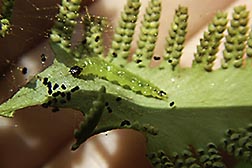| Read the magazine story to find out more. |
|
|
|
|
Looking for 'Natural Enemies' in Asia to Control Invasive Plants
By Sharon Durham
November 2, 2016
This June, Agricultural Research Service (ARS) ecologist Melissa Smith traveled to Asia to collect insects that can control the spread of several invasive plant species in the United States that originated in Asia.
Predator and prey co-evolve in nature's "arms race" for survival. When plants and animals are moved from their native habitats to new locales where they have no natural enemies, their populations can grow unchecked.
Paper bark tree, Old World climbing fern, and downy rose myrtle—all native to Asia and highly invasive in Florida and Hawaii—are just a few examples.
Smith, who is based at the ARS Invasive Plant Research Laboratory in Fort Lauderdale, Florida, visited Singapore, Malaysia and Hong Kong from June 3 to June 20 and chronicled her collection trip in a scientific diary.
The Singapore entry concludes with the following passage: "Singapore continues to be an excellent source of material, especially for Old World climbing fern, due to its proximity to both mainland Asia and the South Pacific islands. Additionally, the Singapore Ministry of Agriculture has a long working relationship with the Australian Biocontrol Laboratory and ARS, and regularly and efficiently grants export permits for plants and insects."
The Malaysia leg of the collection trip also proved fruitful. Smith writes: "We are currently pursuing an export permit with Malaysia, so all findings from this trip will be used for future collections. While these fact-finding trips do not yield immediate tangible collections, they're invaluable for subsequent efforts, because they resolve most of the logistical issues and locate many of the populations."
Smith is planning to explore new sites in the Philippines and Indonesia.
Invasive species are one of the leading causes of environmental harm, including threats to biodiversity, decreased agricultural yields, and impacts to human health. Biological control represents some of the most cost-effective and sustainable methods of long-term control of invasive species. Foreign surveys are the first step in a multi-faceted process to provide new biological control agents for large-scale plant invasions.
Read more about Smith's collection trip in the November issue of AgResearch.
ARS is the U.S. Department of Agriculture's (USDA) in-house scientific research agency.

